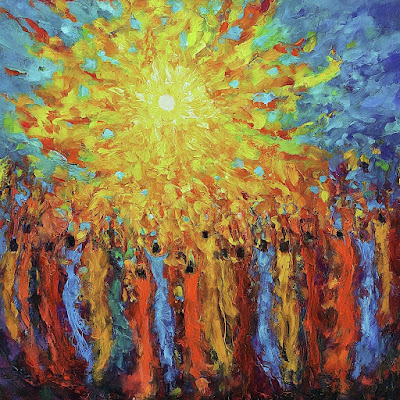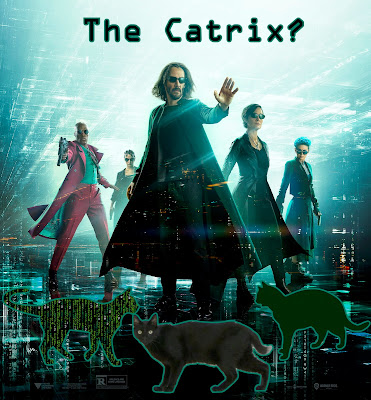Theology, Ethics, and Spirituality centered on the Trinity and Incarnation, experienced through Theosis, in Sacramental Life, leading to Apokatastasis, explored in maximally inclusive ways. And other random stuff.
2024-03-17
You are a Theophany
2023-12-02
The Panentheism of Creation in Christ
2023-10-15
The Complexity of Love's Simplicity
Divine Simplicity is simply too simple
2023-06-28
The Many Loves of the Love of God
When we speak of the Love of God, or praise God for God's Loving-Kindness, we are remembering that above all, God is Love. But this Love is not merely the feeling we tend to associate with liking something a great deal, such as when we say "I love this coffee" or "I love that activity". Rather, we mean that God's Love is something deep and active, constantly working for the abundant life and flourishing of those God loves. In short, it is Love operative in sacrificial acts of kindness: Loving Kindness. Many Scriptural words and concepts fill out what this Divine Loving-Kindness means.
2023-01-01
Scriptures on experiencing Divine Light
I figured I would start the year with a little Bible study. Here are some things that Scripture tells us about Divine Light and how we may experience and embody Light in our lives. The following is a Scriptural outline on how we can experience Divine Light, through Jesus Christ, but the power of God's Spirit.
2022-07-27
The Metaphysics of Materialism
2022-07-15
Why God cannot be evil
2022-06-11
Is Love stronger than hate?
2021-12-30
Resurrecting the Matrix: An Ideological Review
2021-03-08
God is...
2021-01-16
A Provocation on the Constant of Change
2020-05-16
Theological Topology: Placing the Trinity in Reality
At first glance, topology and theology have nothing to do with each other. Theology, on one hand, is "the rational discussion of God" (from the Greek words "theos" meaning God, and "logia" meaning study of, or reasoned discourse about). Topology, on the other hand, is the study of geometric properties and spatial relations between various kinds of objects in space, and the way in which constituent parts are interrelated or arranged. So, theology seems to deal with an Ultimate Reality beyond our world, while topology deals with spatial relations within our world. Nothing could be more different. It is like comparing apples to oranges, or Infinite Being to mere beings.
2020-04-03
When Words Fail
How both Theistic and Nontheistic language fails to describe Ultimate Reality
In the constant back and forth between Theists and Nontheists, one of the frequent criticisms hurled from both sides regards the problem of language. Both sides claim that that other side slides into nonsensical or tautological language that fails to say anything about Reality. At some point, each side gets to ideas that are so foundational, so axiological, to their interpretive framework, that all they can say is "it is what it is".
2019-05-17
Visions of Ultimate Reality
The goal of our spiritual journey is to explore what is True, pursue what is Good, and practice what is Beautiful. And this journey begins with the question: What is Truth? Some say that Truth resides in a Holy Book of some sort, or a set of infallible statements about Reality. Some claim Truth is found in an inner experience, while others say it is found in evidence gathered from our senses. And then we find great spiritual teachers, such as Krishna who says “no Truth is superior to me”, or Jesus who says “I am the Way, the Truth, and the Life”. Despite all of the apparent differences, these visions of Truth share some commonalities: They assume we are part of a greater Reality. And we come to experience Reality, as it really is, through many ways. These ways include books, and our senses, and inner experiences, and relationships with others. Through these ways we find Truth when our inner self conforms to what is really Real, and we are brought into harmony with Ultimate Reality. And in history there are enlightened persons-- like Krishna and Buddha and Jesus-- who are so filled with Ultimate Reality that they claim to be living embodiments of Truth.
So what is the greater Reality that we need to conform ourselves to, so we also can embody Truth? What is really Real in the world we experience? What is the Ultimate Reality which is beyond, or within, or underneath, the apparent reality we experience every day?
2019-01-28
In the Divine Symphony: Why I think God is Real
In the school where I am chaplain, two of the skills we try to teach students are: First, how to build an evidence-based argument, and second, how to present the view you hold without demeaning or belittling those who disagree. This is especially true with controversial subjects that people hold strong opinions on.
Since we give feedback about this so often, to so many of our students, I thought I would create an example of a controversial, evidence-based argument, which was presented in a way that sought to include even those who disagree with my conclusion. And voila: This sermon was born. The texts read before this sermon included: Psalm 19.1-9; Acts 17.27-28; Romans 1.19-20; 1John 4.7-16.
As we continue our journey through Epiphany, the season when Christ's Light shines on ALL kids of people, through ALL kinds of experiences, I wanted to challenge you a little today about HOW we see God's Light. And this challenge comes from a question I frequently get asked, and that I was asked again last week. The question goes something like this:
"Fr. Nate, you seem like a smart guy. How come you still believe in God?"
2018-11-05
A Provocation on Polytheism
2018-07-09
Credo: The Story that Reads Us [A Mini-Systemic Theology]
This was originally written in 2006 in partial fulfillment of requirements for Systematic Theology at Perkins School of Theology at Southern Methodist University. It is fairly representative of my current thought, although in several ways I have built on, or superseded, what is written here. This is especially true in matters dealing with Science, World Religions, and Socio-Economic Justice.
This is the FULL 18,000 word original version that was trimmed to around 10,000 words to be turned in. Note that all endnotes have been removed from this version, due to the limitations of the blog format. However, all sources cited and consulted are found at the end of the essay.
A Prayer: Lord Jesus Christ, send forth your Spirit that I may say what needs to be said, in space allowed, and bear witness fully to your Father's Glory and His Story which writes us all. Amen+
2018-06-17
Why God feels sorrow and joy
Is God able to truly feel sorrow over our failures? Does God truly rejoice with our successes? Today in Church our lectionary included the text from 1Samuel 15 that "The Lord was sorry that he had made Saul king over Israel". This is a wonderful text which leads into several interesting theological places I have wanted to write about for some time. To get to those places, let's start Biblically.
2018-02-07
God, Gender, and Washington Episcopalians
Recently the Episcopal Diocese of Washington passed a resolution about gendered language and God, and the internet, predictably, went crazy.
This issue touches on a number of issues Biblically, Theologically, Ethically, and Aesthetically. None of these issues are particularly complex in and of themselves, but taken together it creates an issue where people absolutely lose their minds. Before commenting, let's read what the resolution actually says: They urge the Episcopal Church to "utilize expansive language for God from the rich sources of feminine, masculine, and non-binary imagery for God found in Scripture and tradition and, when possible, to avoid the use of gendered pronouns for God." That's it. That's all of the language of the resolution. There is no attempt to prohibit male images, titles, and pronouns for God, but to balance them with images, titles, and pronouns drawn from Scripture and Tradition which reflect other aspects of God as well.

















